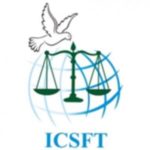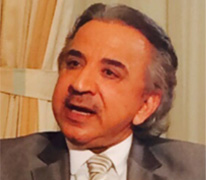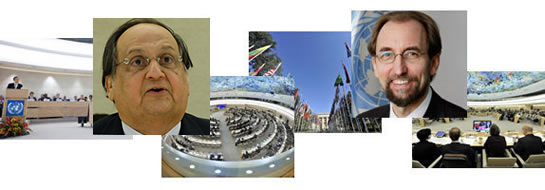34th HRC: High Level Segment and panel on Human Rights Mainstreaming
Wednesday 1 March 2017 marked the end of two days high-Level segment discussion with the participation of 107 dignitaries, and 11 delegates from least developed countries and Small Island States, where panellists urged the world to take action in the fight for the protection of human rights and insisted on the fragility of the situation.
During the high-level segment, H.E. Mr. António Guterres, Secretary-General, H.E. Mr. Didier Burkhalter, Head of the Federal Department of Foreign Affairs, Switzerland, Mr. Zeid Ra’ad Al Hussein, United Nations High Commissioner for Human Rights, H.E. Mr. Joaquin Alexander Maza Martelli, President of the Human Rights Council, and H.E. Mr. Peter Thomson President of the General Assembly shared insightful opening remarks about the current situation on violations of human rights, where the Secretary-General called for the abolishment of death penalty, emphasizing the importance of protecting the rights of minorities and supporting the protection of human rights defenders who are under constant threat for expressing freedom of speech, assembly and peaceful protests. Furthermore, he stressed that the “disregard for human rights is a disease, and it is a disease that is spreading”, and urged member states to take action.
The High Commissioner went on declaring that our world would be that of chaos and warfare if human rights are not respected, and that “when humans understand fully they have rights, it is next to impossible to make them un-know it”. H.E. Burkhalter recognized the importance of the relentless work of human right defenders and the significance of a transparent human right council.
Some member states echoed the address of the SG and HC. Amongst, Sweden urged the protection of human rights and shared strong support for the abolishment of inhumane acts such as death penalty and torture, as well as strongly condemning All perpetrators of human rights violations. H.E. Mr Samuelsen, Minister for Foreign Affairs, Denmark condemned human rights violations in Saudi Arabia and Yemen. As well H.E. Koenders Ministry of FA Netherlands stated that it is the governments' responsibility to protect human rights and submit to the law.
Nonetheless, Mr. Bandar bin Mohammed Alaiban, the Minister of the Human Rights Commission in Saudi Arabia claimed to have respect for human rights in front of the council and blamed Houthis for the atrocities in Yemen. While in reality, due to the unhinged barbaric act of the Saudi-led coalition Yemeni civilians have suffered both as a direct result of the airstrikes, and from the coalition blockade and obstacles to the delivery of humanitarian assistance. In light of this, Mr. Alaiban’s statement was offensive to all innocent victims suffering this cruelty, in particular the most vulnerable children and women of Yemen.
In keeping with the theme of denial and absolute impunity and despite the deteriorating human rights situation in Bahrain, H.E. Mr. Abdulla Faisal Al-Doseri, Deputy Minister for Foreign Affairs Bahrain, claimed his government prioritizes the safety and wellbeing of its citizens while executing activists and dissidents.
The human rights council also held its first annual high-level panel discussion on human rights mainstreaming with a focus on the contribution of human rights to peacebuilding through the enhancement of dialogue and international cooperation. The council focused on addressing questions such as how peacebuilding could be improved by including mainstreaming of human rights in the UN’s 2030 Agenda, as well as the ways enhanced dialogue and cooperation on promotion of human rights between countries could play a part in the amelioration of peacebuilding.
During the annual high-level panel on human rights mainstreaming, opening remarks were given by H.E. Mr. Peter Thomson, President of the General Assembly and Mr. Zeid Ra’ad Al Hussein, United Nations High Commissioner for Human Rights. Mr Thomson stated the importance of human rights in the optics of peace and development stating that “there can be no sustainable development without sustaining peace, and no sustainable peace without sustainable development”. The High Commissioner highlighted “deprivation, discrimination and violations of human rights are at the root of virtually every conflict”. The high commissioner also pointed out the disconnect in the works of the different UN organs, where its “division into silos– peacebuilding work on the one hand; human rights on the other – has meant that our understanding of the link between justice and sustainable peace is still not always shared by all institutions and stakeholders within the international community”.
After the opening remarks, the panel has proceeded with Ms. Julienne Lusenge, President of Fonds pour les Femmes Congolaises (FFC) and Founder and Chair of the Board of Solidarité Féminine pour la Paix et le Développement Intégral (SOFEPADI) from the Democratic Republic of the Congo, reminding the importance of women as key to opening the door to peace and human rights. In addition, she urged to stop considering human rights defenders with the hypocritical attitude that is being of no use for human rights defenders and civilians suffering, being wrongfully executed and deprived of all of their human rights in countries such as Bahrain, Saudi Arabia and Yemen. Among interventions of member states, the EU, Switzerland and Ireland all shared the common goal of avoiding conflict by supporting, promoting and respecting human rights. The EU said “our efforts must be inclusive, involving all segments of society, "leaving no-one behind" when emphasizing that the right to life is every human being’s right. Khiam Rehabilitation Centre for Victims of Torture also took the floor to denounce Bahraini government's claims on implementing 90% of 156 resolutions and continuous acts of torture.
International Council Supporting Fair Trial and Human Rights (ICSFT) fights for human rights of all people, with a particular focus on the countries of the Gulf region. ICSFT strongly condemns Bahrain, Saudi Arabia and Yemen for their crimes and urges these countries to abolish death penalty, torture, and other cruel, inhuman or degrading treatment, as well as the atrocious acts targeting human rights defenders who fight for freedom of expression, assembly and religion. In countries like Bahrain and Saudi Arabia, human rights defenders are constantly being wrongfully arrested and tortured for peacefully protesting in favour of basic human rights, such as freedom of expression and assembly. The circumstances are critical and dangerous. We will keep updating our advocacy archive on the positions taken during the council and raise awareness with oral statements and side events on human rights issues in countries of the Gulf region, as well as reminding countries of their obligations towards people deprived of their basic human rights.
International Council Supporting Fair Trial and Human Rights



